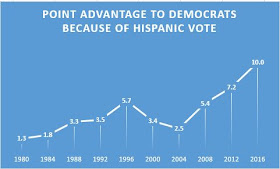Hispanics are a growing percentage of the population. Since about 1980, they've had a growing tendency to vote Democratic. This combination is deadly for the GOP. In 1980,they had a small impact on the election. In 2016, their impact will be huge.
Republicans have won 5 of the last 11 presidential elections. If Hispanics had the same impact on each of those past elections as they'll have on this one, Republicans would have won only 2 of the last 11.
If your group makes up 50% of the population and your group is 50 points more likely to vote Republican (75% of your group votes Republican vs. 25% who votes Democrat), you will swing the whole election by 25 points. That is, if you're a big group and have a strong tendency to vote one way, you'll probably decide the election.
If an election is close, though, you don't have to be 50% of the population to make the difference. Even if you are 5% of the population, if your group is 50 points more likely to vote Republican, you will swing the election by 2.5 points, enough to give Republicans a victory in a close election.
In 1980, Hispanics made up 6.4% of the population. 56% of them voted Democrat and 35% voted Republican, giving Democrats a 21 point edge. So, with a 21 point edge among 6.4% of the population, Hispanics impacted the 1980 vote by 1.3 points. If the rest of the nation were evenly split, they'd have given the Democrat a victory by 1.3 points. (In fact, Reagan beat Carter by 9.7 points, 50.7% to 41%.)
The Hispanic edge in Reagan's first election in 1980 was 21 points. It was even smaller in 2004 at 18 points. (George W. Bush speaks Spanish.) But generally speaking, Hispanic's tendency to vote Democratic has edged steadily in Democrats' favor.
This year, the gap is the highest on record. and the percentage of Hispanics is its highest on record. That's a pretty powerful combination. 73% of Hispanics are likely to vote for Clinton and only 16% are likely to vote for Trump. Coupled with the fact that Hispanics are now 17.6% of the population, this translates into a 10 point impact. That's huge.
Of course this overstates their impact at least twice, though. First, Hispanics are not evenly distributed around the country; they are not going to impact Ohio's election as much as they will California's. (Although Florida, a swing-state, is third behind California and Texas for number of Hispanics and there is a decent chance that Hispanics will change Arizona's traditionally Republican vote this year.) Secondly, Hispanics are less likely to vote than the general population. Nonetheless, this calculation makes an important point: Hispanics will impact this election more than they have any election in history and that impact is big.
Trump didn't just attack illegal aliens. He attacked an American-born judge of Mexican heritage. As House Speaker Paul Ryan pointed out, that's a textbook definition of racism. It's no wonder that so Hispanics are voting against him. Central to the question of whether the GOP has a future is this question of whether Republicans can win them back.
How big is a 10 point impact? Enough to have made Reagan a loser in 1980. Think about that. Even if the GOP can offer a candidate with Reagan's broad appeal, it still will not be enough to win the presidency. That's not much of a future.


No comments:
Post a Comment